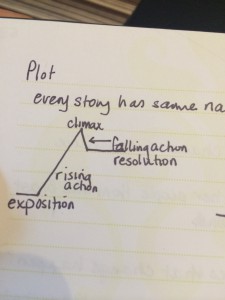I just finished reading The Fault in Our Stars. I’m sure you’ve read it, I think everyone has. I really enjoyed the book, I almost loved it. I wanted to love it. But here’s what stopped me. At the very, very beginning of the book John Green asks us to remember the characters are fictional and the story is made up.
I wish he hadn’t done that.
I know why he did it, or I think I know why he did it, after I finished the entire story. It makes sense when you think about what he put his characters through in his story. But for readers like me, being reminded that the characters are fictional isn’t what I want. I want to believe in them, for the short time that I am living in their world. I want to be driven to go to the library with my friend and hunt through stacks of National Geographic magazines looking for photo credits for Robert Kincaid.
But being reminded of the characters are fictional definitely had me reading parts of this book as a writer, not just as a reader. It was very clear what the main character in the story wanted, and how she was in a knot. I was curious how the author would build the story, which is different than being curious about what the character would do. I never used to read like this. I would let my mind travel the path the author laid before me. Now I think about character arc and narrative structure and the internal struggle and the external struggle and the new normal. I feel like I’m dissecting dead things in a lab when that happens.
Was I reading passively before? Am I reading actively now? Is one more valuable or useful than the other?
An interesting point in The Fault in Our Stars stimulated some discussion with my husband and I’m still pondering the concept. One of the characters questions the idea that you need pain to feel joy because knowing how broccoli tastes has no impact on the wonderful taste of chocolate.
In the same author’s note at the beginning of the book, Green also asserts that remembering characters are fictional doesn’t mean they don’t matter. That even made-up stories have value, and that’s a foundational concept for our species.
I already believed that made-up stories mattered. I think some part of me, the part that most adults call childish or naive, always thinks that even the most outlandish stories are probably true sometime and somewhere. I just don’t want authors sticking their fingers in my face and saying, “remember, this is made up. Now try to love these people like they are real while you remember that.”
Just let me suspend my disbelief, for a little while! Let me drift along with your characters!
But I also want to write stories and write them well enough, that my special readers can’t help but love my characters as much as I do. So maybe I do need to start reading like a writer. Somehow I can’t help but feel a little sad at the thought of that. Is there any way to have it both ways?

